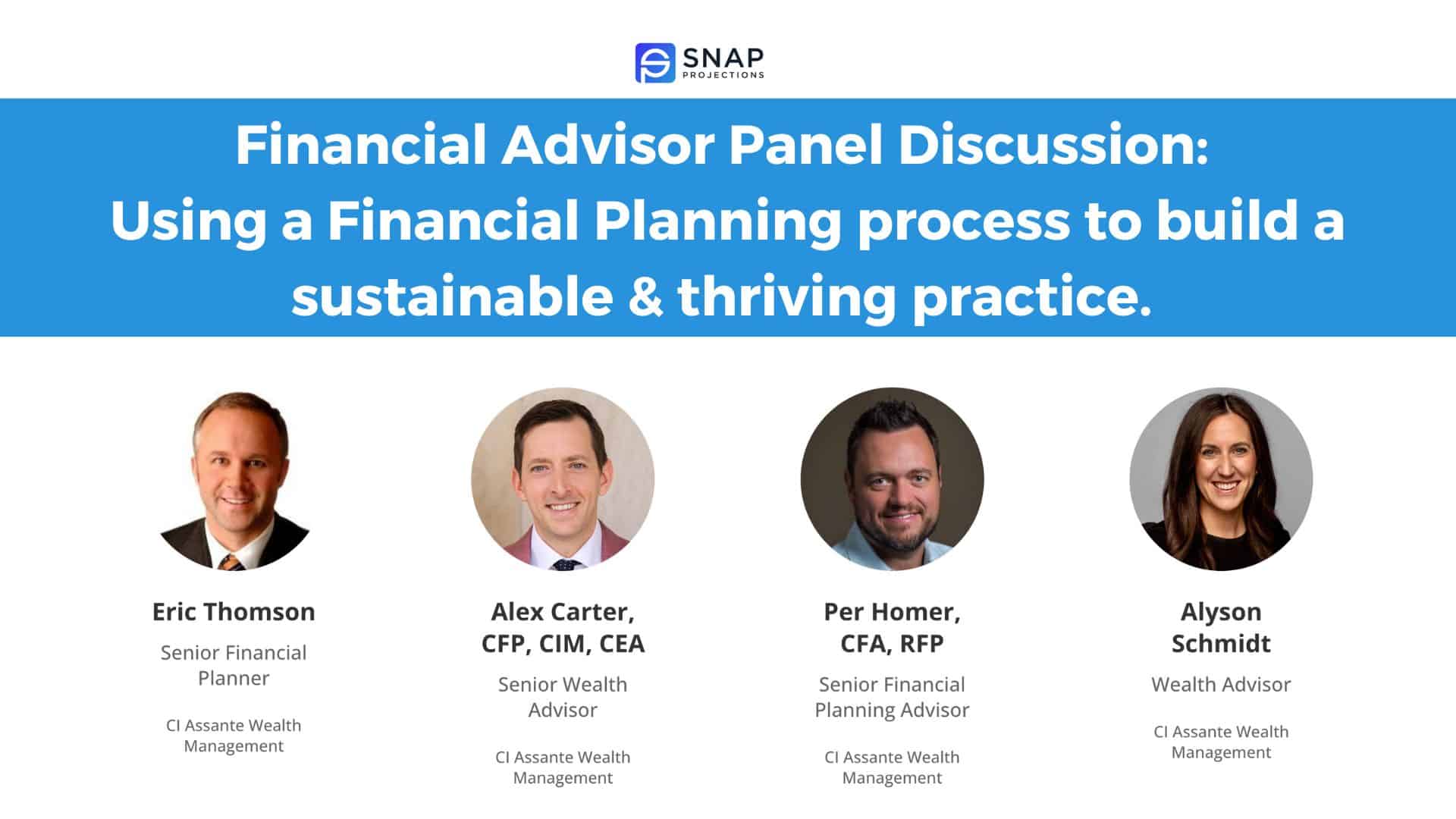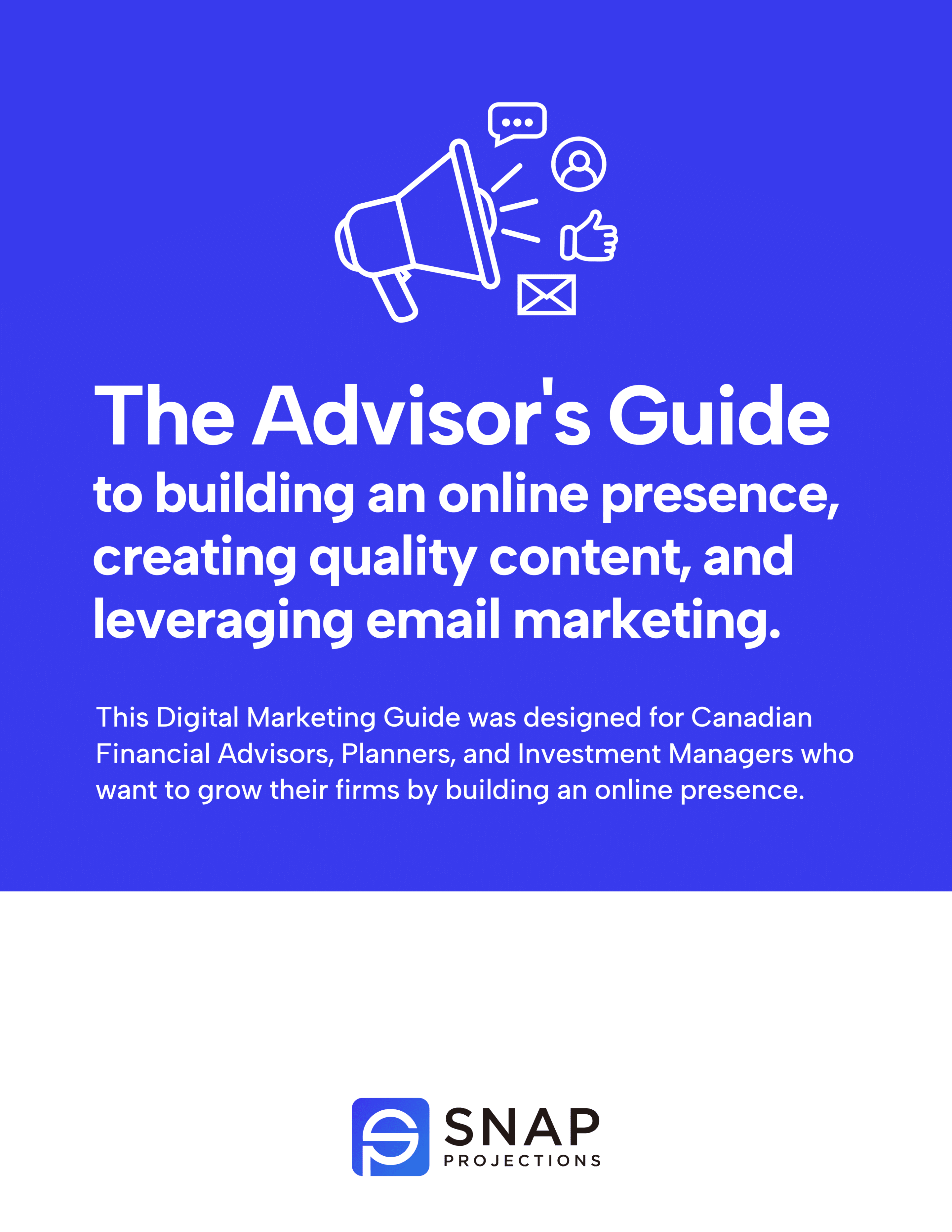Do you have clients who don’t see the value in planning?
When your clients don’t think they need a financial plan and you’re having a hard time articulating the value, what can you do to help them understand?
Learn what strategies 4 top Advisors are using with great success to easily demonstrate the value of financial planning, grow their assets under management, and scale their practices.
In this panel discussion session recording, you’ll hear from 4 Financial Advisors who all bring a unique perspective to the table. Because even as an experienced Financial Advisor, it can sometimes be difficult to transition the client conversation from investments to planning. Often, your clients do not come to you asking for a financial plan. They come with financial questions, which you know can be addressed through the financial planning process. But it’s not always simple to get your clients on board.
You’ll walk away from this session with actionable tips and ideas on how to effectively demonstrate the value of planning while sparking conversations that will engage your clients and get them excited about the process.
Here are just some of the highlights from this session.
How do you qualify your prospects and how does this relate to your financial planning process?
For Eric’s firm, qualifying is based on several components. They do typically have asset minimums but the focus is more on the complexity of the financial planning that is needed and the value that they think they can bring to the table for the client. Next would be prospects that come via referrals from existing relationships, and then there are young professionals who don’t necessarily have a large asset base but have the capacity to start building in a short period of time.
Eric’s process has changed and evolved over the years, but he does admit they have not been as focused as they should have been. His firm intends to make that a high priority moving forward to reduce leakage and capacity constraints, thus ensuring they continue to be able to provide the best possible value to their clients.
For Alex, his approach is to start by spending an hour with someone (whether it’s in person or on the phone) to understand the complexity of their needs. His firm also typically has minimums, unless it’s a young professional with the capacity to quickly build assets.
Alex’s firms invests heavily in time upfront, to mine-map their situation and ensure they walk away with several concrete ideas. If it looks like a good fit, prospects are invited into the family. If not, they are referred to a colleague who is better suited to serve them. This process is always evolving, particularly over the last 5 years as they have grown and experienced capacity issues.
For Alyson, it’s always been more of a small town approach. If a prospect has a good attitude, her firm is happy to talk to them. This has resulted in growth and a great business but has of course also resulted in capacity constraints.
Alyson believes that as you dig into the planning process, you can determine opportunities that were not obvious. Throughout the discovery process, it’s important to try to understand where value can be added and identify what the best path forward is. As a small town office with family ties, her firm strives to be an extension to their clients’ families and they always factor long-term relationship potential into every thing they do.
Per is running a financial planning forward shop. For his firm, most referrals and prospects are already coming through the door wanting a financial plan. They want to work with clients who are seeking out and willing to take advice, and each Advisor on his team has their own minimum. But, in line with the other 3 Advisors on this panel, they do make exceptions for those young and hungry working professionals who are quickly accumulating.
Many of Per’s prospects come from referrals; he has a unique way of being active in community Facebook groups, both for prospecting and charity work, and also creates quality content for his online audience.

Download your free digital marketing guide for Canadian Financial Advisors, Planners, and Investment Managers here.
Let’s say you have a new prospect that meets your minimums but does not want to go through the financial planning process with you. What do you do? Have you ever rejected a client? Would you try to educate them on the value of planning?
For Eric, it’s an education process. In his experience, typically people just don’t know what they don’t know. They have used all their time on working and building wealth and not necessarily associated themselves with financial professionals. They are building and maybe have an accountant, but they aren’t really looking forward and planning — that’s where Eric and his team can come in to help build on what’s already been created.
Eric has found that most people who don’t want to do planning simply don’t know what that planning will result in, or maybe they are fearful of what that planning will look like. More often than not, the planning process creates more value and opportunities for the client. Conversations, relationships, and trust all come through the discovery process which creates the opportunity for value-added planning.
Similarly, Alex’s firm believes in adding value through planning. After seventeen years of doing this, he has learned that finding a hot topic that his clients are interested in is key. The opportunity to uncover these interests comes through the discovery process, and that isn’t a one-time thing.
One of Alex’s investment-only clients recently become a Grandparent. This life event triggered the desire to ensure all assets were protected and would flow to his adult daughter and her child. The opportunity for estate planning appeared, but it would not have been uncovered without the diligent relationship work that allows Financial Advisors to stay in tune with their clients lives. Clients who aren’t worried about running out of money can often feel like they don’t need help or planning, but a life event can quickly change that. Through relationship-oriented services, those conversations wind up chipping away at those guarded exteriors. Having those connections to be able to collaborate effectively allows you to solve problems and identify opportunities to transition investment focused clients to planning based clients.
In Alyson’s experience, there are a few common reasons why some people may be resistant to planning. Sometimes it’s because planning has such a loose definition and it’s not clear what it entails. If the prospect hasn’t come via referral, they may think you’re trying to sell them something. Plus, they may have been let down by financial professionals in the past.
Alyson’s approach is to gauge the temperate and their attitude. She has found that if you can just start with data entering, gather a few things and then answer a few questions (ie model what you can), people always want to see the second version with additional information. This is where Snap Projections comes in with prospects — you show them what you can with the information you have, and then they want to see more. Don’t ignore your existing clients who have closed the door on planning previously. Continue to try and gather data and as things change in their lives, continuing to have those re-discovery meetings will help guide them to meet their own objections. Ask those questions and it starts triggering that uncertainty. You can combat that uncertainty with data.
Per and his firm have found that starting small with net worth tracking often leads to a person eventually wanting a financial plan if they were initially resistant to the idea. Often, as the net worth is being followed, a life event will occur and that creates the desire for a financial plan. Fees are inclusive of planning and advice regardless, so most new clients are not rejecting the planning aspect.
Per has found that over these last several years, as the pandemic unfolded, most people became aware of their own mortality and realized they needed to get their lives in order — because what if the worst happened? Additionally, rising interest rates have gotten the attention of younger people. Most have never lived in this environment. They are used to money being free and have begun to realize they probably need to get some advice before making big decisions.
How is the financial planning process related to the growth of your practice? What’s the correlation between financial planning and building a successful Advisory practice?
For Eric, it’s a straightforward answer — you can not go into a competitive situation without having answers. If they have questions, you need to be able to quantify and validate your answers. The goal is always to manage fewer relationships so that those you serve are getting the most value. This means having more assets under management from fewer people, and it’s the planning process that makes that relationship possible. Once you’ve given your clients that peace of mind, it leads to referrals.
Alex’s advice is always try to engage both spouses. He’s found that with investment-only clients, it’s common for just one spouse to be involved. But with planning, that doesn’t work. The majority of widowed spouses will change Advisors, so you need to do the relationship work (with both) upfront if you want to maintain that future business.
In Alyson’s experience, referrals never come from rates of return — they come from people who have experienced the outcome of your planning. When an Advisor is entering an established practice, planning will be integral to learning and building trust with existing clients. As firms grow and bring on new Advisors, assigning that new person to be the planning person will add a ton of value. For example, how can you keep planning based on current data? Always plan for the life of the money, not the person’s name it’s in. Planning and continued data collection allows you to be proactive rather than reactive.
Per says that if you’re looking to grow your practice, the first place you need to look is internally. If you want to hold 100% of your clients’ assets, financial planning is what will give you that opportunity. If you want to stay competitive, the only way you’re going to do it is through personalized financial planning. You have to differentiate and bring human advice.
Per’s firm actively seeks out feedback from their clients in an effort to continually improve the quality and level of service they provide. He admits it was scary at first but once they took the plunge, what they got back were honest answers and valuable information about what their clients cared about. Per has found that people typically respond well to vulnerability and often reciprocate, but someone has to start. It’s how you build trust, particularly with those who have been slow to open up.
Want to hear the rest? You’ll have to watch the video!
Meet your speakers:

Per Homer, CFA, R.F.P.
Per has over 25 years of experience in the financial industry and began his career as a trader and portfolio manager at the Bank of Canada and CMHC and also worked as Head Trader & Director at Citigroup. He is a Chartered Financial Analyst (CFA) charterholder and Registered Financial Planner (R.F.P.) with an Economics degree from Queen’s University.
He is active in his community as Vice-Chair of the Board of Kay Blair Hospice, a new hospice to be built providing hospice residence end-of-life care for the Brampton community and as an admin in the Oakville Dads Facebook group, raising tens of thousands of dollars each year for the Oakville Fare Share Foodbank and Oakville Meals on Wheels.
Over the years, he has come to realize that his passion is helping people navigate through the financial world – an area of our lives that can seem very overwhelming and confusing. Helping families achieve their financial goals and meet some of their lifelong dreams is his goal. He can help you – no matter what your current financial picture may be.
As a husband and father of two wonderful girls, he can understand the pressures and stress your financial picture can place on you. Let him lift some of the weight off, clear the confusion and reduce the stress in your life.

Alyson Schmidt
Alyson is a Vancouver Island based Wealth Advisor, driven by passion, purpose and the pursuit of lifelong financial well being.
A proud second generation Assante Advisor, Alyson’s precocious ability to connect, understand the big picture, simplify complexity and clarify misinformation is what makes her a trusted steward of many multi generational client family’s financial well being. Together with her dynamic Schmidt & Associates team, Alyson provides clear, reliable advice, customized planning support and professionally managed investment programs, wrapped up with best-in-class service and family focused client care.
Alyson has an undergraduate degree from Brock University and is licensed in both securities and insurance.

Eric Thomson
Eric Thomson has been sharing advice on how families across Canada can protect their assets for 28 years. As a partner at his firm since 1994, he specializes in helping business owners with utilizing tax strategies, maximizing capital allocation, and efficient ownership transfer at retirement.
Eric currently donates some of his spare time sitting on the Board for the North Bay Regional Health Centre Foundation and to his kids’ various sports teams. Outside the office, Eric enjoys the outdoors and spending time with his family.

Alex Carter, CFP, CIM, CEA
Alex is the branch owner of multiple Assante Capital Management Ltd. locations. Since taking over his father’s branch in 2011, he has grown the business to five times the value of what he originally paid for it.
As a senior wealth advisor to high net worth families, Alex enjoys the collaborative process of working with people to accomplish their goals in life and legacy. His latest accomplishment includes becoming an author of his first book, Exit Strategy, where he unravels the complexities of succession and leaving a business, offering clear, straightforward solutions.
Alex and his father have founded and maintained philanthropic foundations to assist the disadvantaged and provide for the greater good. Giving back is a big part of the humanity that Alex displays as a professional. Today, Alex has homes in Toronto and Collingwood, Ontario, where he enjoys spending time with his wife and children. Alex is also enthusiastic about travelling, outdoor activities, and, of course, playing squash.

